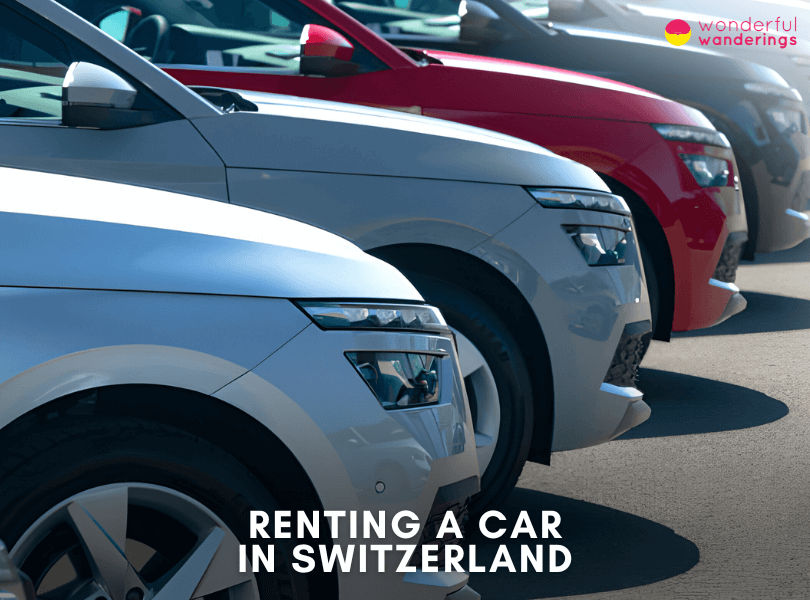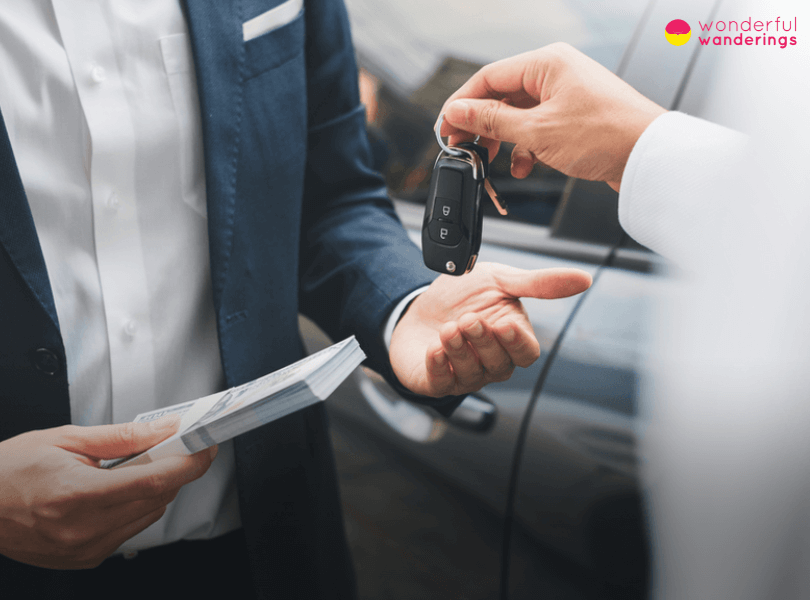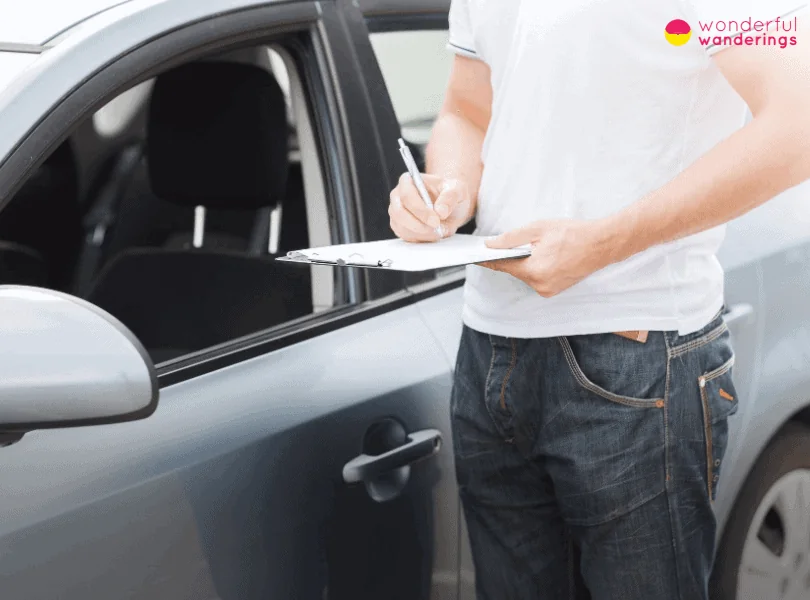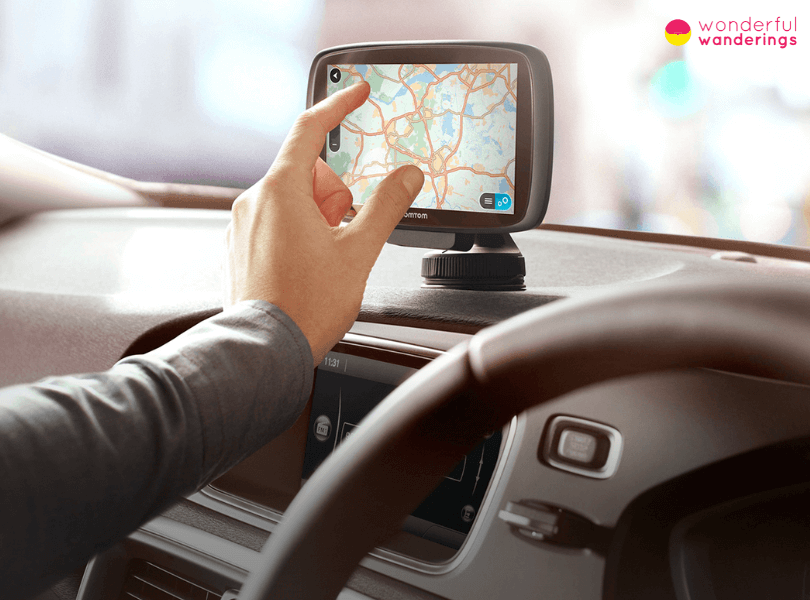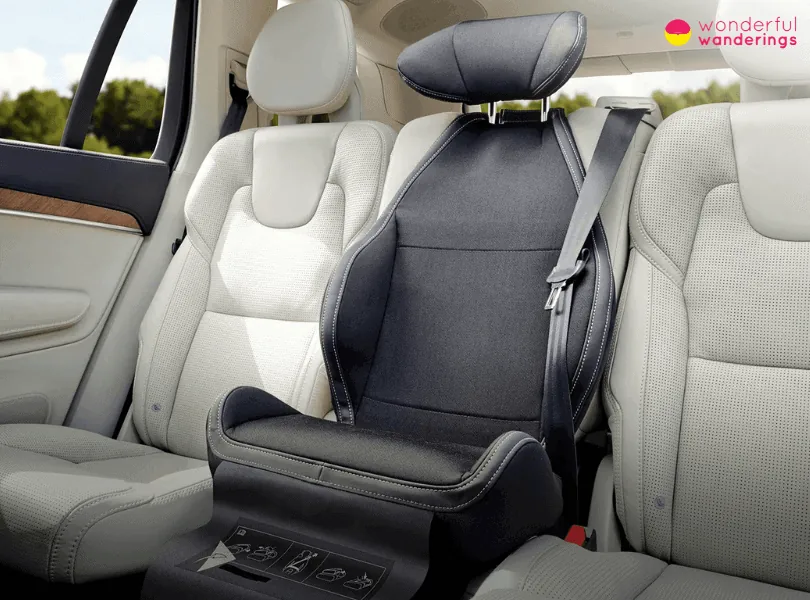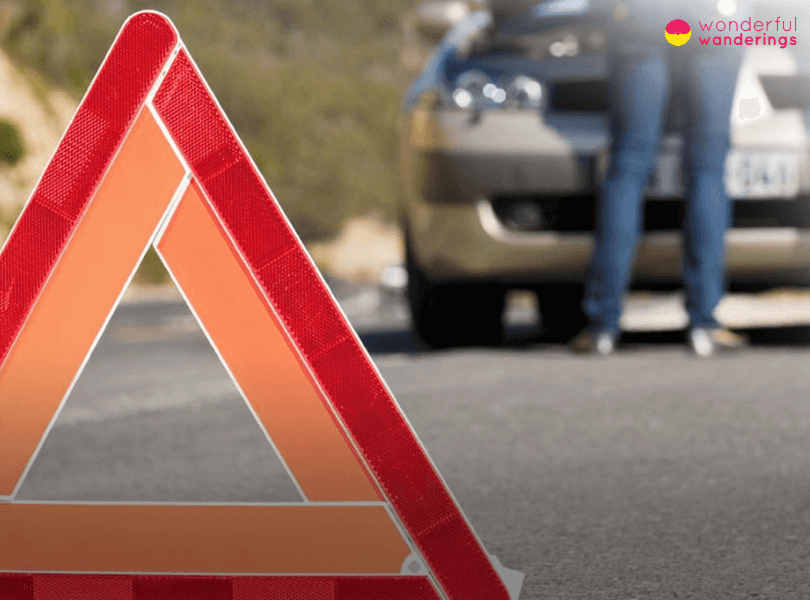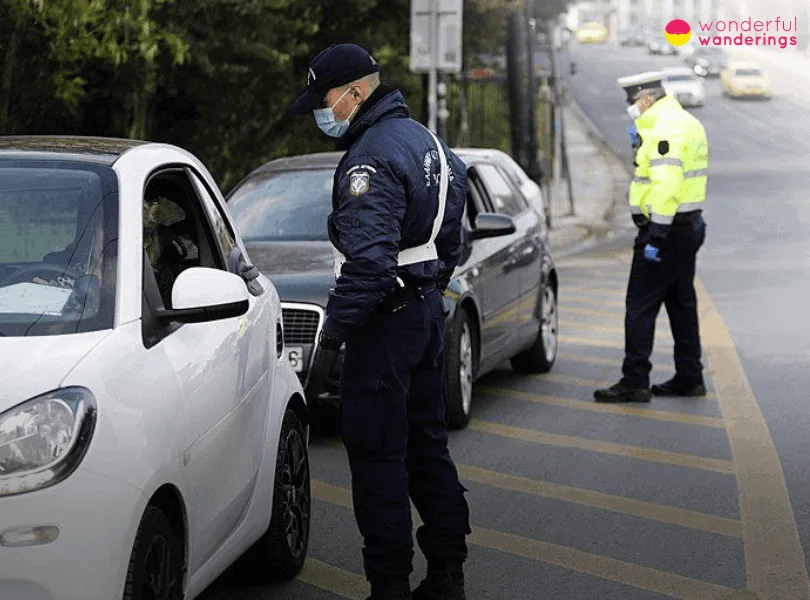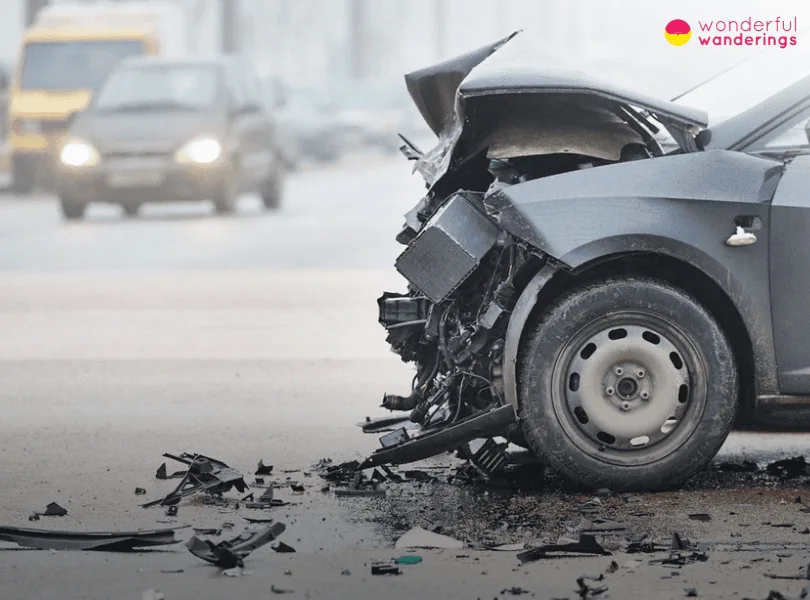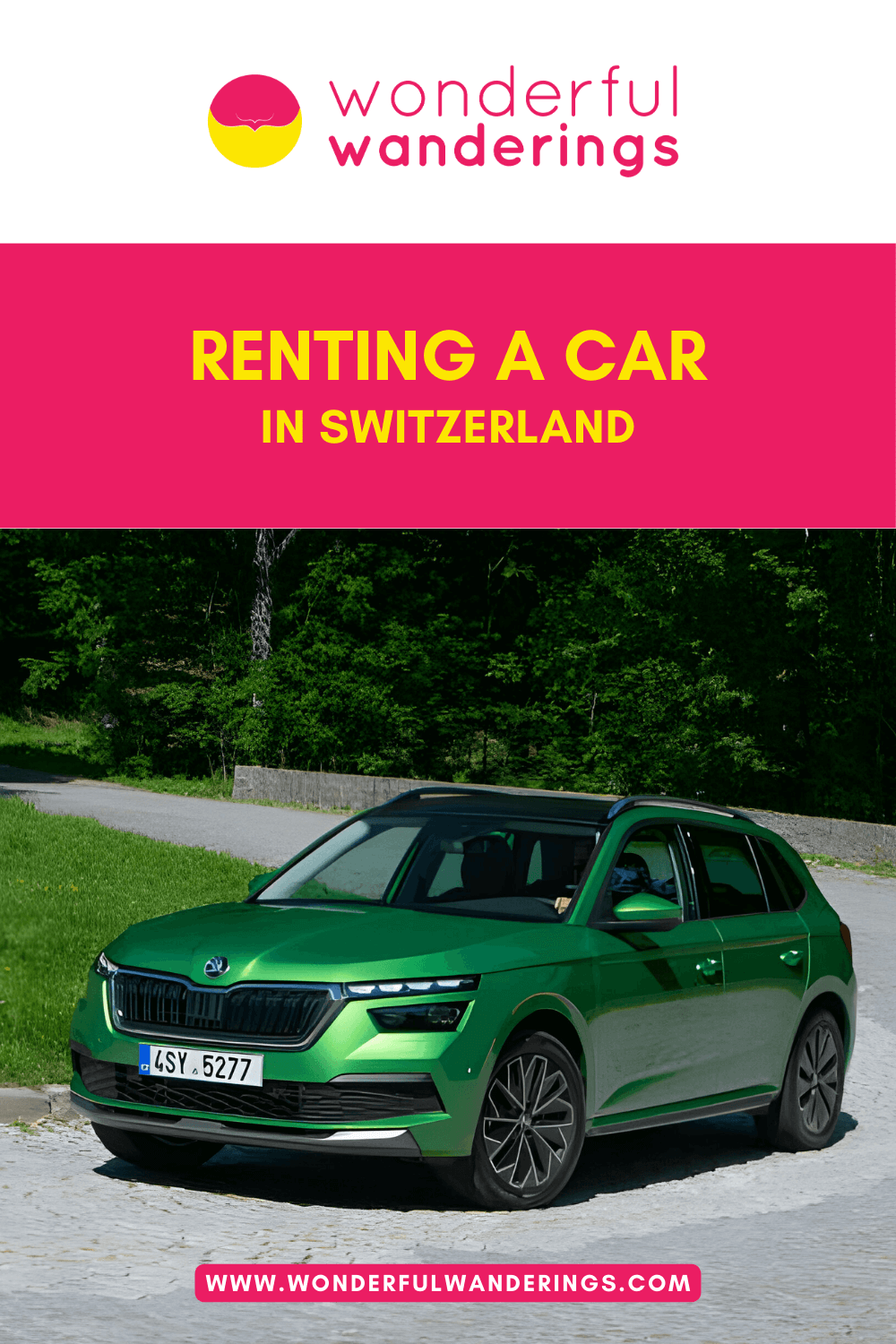Driving in Switzerland, safety tips include being prepared for frequent tunnels, narrow mountain roads with steep unprotected drops and hazardous weather conditions like snow or fog that can emerge suddenly. Drivers must adjust speeds, utilize headlights in tunnels and have snow chains in winter. Other vital safety practices are wearing mandatory high-visibility safety vests if stopped on the roadside and keeping warning triangles on hand. Proper etiquette requires strictly obeying speed limits, always yielding at unsigned intersections and never honking the horn unless warning of imminent danger.
Useful tips when renting a car in Switzerland include reserving early for lower rates, double-checking license and age requirements between 20-25 years old, declining unnecessary insurance add-ons and reviewing one-way/border crossing policies for extra fees. It is recommended to verify if snow chains or child seats must be reserved and clarify who handles toll payments. Driving in Switzerland is easy due to the well-maintained infrastructure, clear road signage in three languages and courteous drivers who follow the road regulations. Car rentals allow travelers to explore Switzerland’s scenery at their own pace. Driving can be an efficient and scenic way to experience Switzerland’s geographic diversity, from the Alps to the metro areas.
1. License to rent a car in Switzerland
Renters must have a valid driver’s license that has been valid for at least one year to rent a car in Switzerland. Renters will need an International Driving Permit (IDP) to accompany the regular license if the driver’s license is written in a language other than English and is from outside the European Union. An IDP translates the license into several languages, including English, French, Spanish and Russian. Renters must show proof of identity, specifically a passport when renting a car in Switzerland. Some rental companies may require renters to be a certain minimum age to rent a car, between 20-25 years old. It is important to check the specific rental company’s age and license requirements when booking a rental car in Switzerland.
2. Age and Experience Requirement
The minimum age to rent a car in Switzerland is 20. Additional young driver surcharges will apply for drivers under 25, making rentals more expensive. Some rental companies enforce even higher minimum age requirements of 21 or 25 years old depending on factors like car size and insurance risk. Smaller economy vehicles may have a lower minimum age. Luxury, sports and high-end cars often have a minimum rental age of 25 or even 30 years old. The maximum age limit for drivers to rent a car in Switzerland is usually 70 years old. Most rental companies will not allow rentals to drivers over 70 due to increased risk and insurance costs. Those approaching 70 should check carefully that they meet the car rental company’s upper age limit for renting and driving in Switzerland. Some rental agencies may make rare exceptions for seasoned drivers over 70 with an additional insurance fee. Anyone over 70 relying solely on public Swiss transport should still enjoy sufficient access and mobility.
3. Credit Card Requirements
A credit card is required to rent a car in Switzerland. Renters must have a valid credit card to present to the rental company. Debit cards are typically not accepted. The credit card is necessary for the rental car company to place a hold on funds to cover the rental cost and any potential damages. The credit card hold is meant to provide security to the rental company if the vehicle is damaged or stolen while in the renter’s possession. Even with purchasing supplemental insurance, the credit card is still required as an additional layer of financial protection. Without presenting a qualifying credit card at the rental counter, renters will not be permitted to rent a vehicle in Switzerland regardless of meeting other stipulations like age and license requirements.
Some rental companies may accept debit cards only if the renter purchases specific extra insurance packages. Having a credit card in the renter’s name remains Switzerland’s standard and most widely accepted payment guarantee for car rentals. It provides assurance that charges can still be processed after the rental period if needed, which is different from debit cards tied directly to bank accounts. Being prepared with a valid major credit card is essential for a smooth car rental experience when visiting Switzerland.
4. Guarantee – Credit card hold
Most rental companies in Switzerland will place a deposit hold on the renters’ credit card to cover the cost of potential damages or theft during the rental period. The deposit amount can vary greatly depending on the rental company and vehicle type, but it is typically between €1,056.17 ($1,151.87, £905.80) to €3,168.24 ($3,454.96, £2,717.70). For smaller economy cars from rental companies like Europcar, Sixt or Hertz, the deposit may cost €1,056.17 ($1,151.87, £905.80). For premium or luxury vehicle rentals, the deposit hold increases substantially to €3,168.24 ($3,454.96, £2,717.70) and above. Having a credit card with sufficient credit limit to accommodate the potential deposit will help ensure a smooth rental process when renters arrive to pick up their vehicle. Reading the fine print to understand the deposit policy of the chosen rental company is essential before booking a car in Switzerland.
5. Best period to rent and book
The best time for renters to rent a car in Switzerland is during the spring (March-May) or fall (September-November) shoulder seasons. Summers are peak tourist season with higher rental prices, while winter brings the potential for hazardous driving conditions. Renting a car in spring allows renters to enjoy blooming Alpine wildflowers with fewer crowds. Renters should book their Swiss rental car at least 2-3 months in advance for the best selection and prices. Last-minute rentals will still be available, but choices will be more limited and daily rates higher. Prepaying for the full rental at booking typically secures the lowest price for renters. Some rental companies also offer flexible cancellation policies if renters’ plans change.
6. Pickup / Return Location and Times
Airport pickup or return is not cheaper than picking up in town when renting a car in Switzerland.
Pricing can vary depending on the rental company, specific location and any promotional offers during booking. Airport locations often have longer opening hours and may be more convenient if arriving late at night. There is sometimes an additional airport surcharge or fee ranging from €11 ($13, £9) to €15 ($16, £13) when picking up from airports like Zurich or Geneva. There is no significant price difference for picking up a Swiss rental car during regular business hours versus in the evening. Some smaller local rental agencies may charge a night delivery fee if picking up a vehicle after closing, from 6 pm to 7 pm. Larger international airport companies generally have 24/7 kiosks, allowing self-service pickup without night fees. Carefully review the fine print for extra fees like location surcharges, after-hours or overtime charges. Getting the car at the airport can be convenient when renters first arrive, but checking rates for downtown locations or looking for promotional discounts could get renters a better price. The lowest rates typically require booking several weeks or more in advance.
7. Recommendations for car size and engine
The geography of Switzerland, with its towering Alps, winding mountain passes and narrow village streets, merits careful consideration when selecting a rental car. For exploring Swiss cities, a small economy car like the Ford Fiesta or Renault Clio offers compact dimensions to easily navigate tight urban areas and parking spaces while delivering solid fuel economy. Driving the countryside warrants a car with enough ground clearance and engine power to traverse gravel and steep inclines without sacrificing handling and braking performance on hairpin downhill turns. An intermediate SUV like the Toyota RAV4 or Nissan X-Trail with a 4-cylinder engine delivers an ideal blend of capability and maneuverability. Premium 4×4 models from Audi or Volvo also provide all-weather mountain traction should snow or mud be encountered. If planning to drive Switzerland’s highest mountain passes year-round, only a performance SUV like the BMW X3 xDrive30d or Audi SQ5 truly masters the most demanding terrain and extreme altitudes. Their responsive turbocharged 6-cylinder diesel engines, Quattro or xDrive AWD systems and dynamic handling ensure confidence when roads curve sharply at 13% grades. SUV rewards drivers with the tenacity to explore Switzerland’s vistas accessible solely by high alpine byways.
8. Transmission type (Manual or Automatic)
Manual transmissions are more commonly available and cheaper to rent in Switzerland than automatics. Navigating Switzerland’s challenging mountain roads and steep inclines can prove extremely difficult if renters are unfamiliar with driving a stick shift. Renters accustomed to automatic transmission should stick with what they know for a less stressful driving experience amongst Switzerland’s alpine routes. The price difference compared to renting a manual costs €9 ($10, £8) to €18 ($20, £15) more per day for renters. Automatics tend to have a better fuel economy these days compared to the past. Renting a manual transmission car is an option for renters confident in their stick shift abilities, especially on hilly terrain.
9. Fuel choice (Diesel, Gas or electric)
Renters can choose between diesel, gasoline (petrol) or electric vehicles. Diesel cars are very common in Europe and make up a significant portion of rental car fleets in Switzerland. Modern diesel engines provide good fuel economy, making them a practical choice for covering long distances. Diesel rental cars are more expensive than equivalent gasoline models. Gasoline vehicle rentals encompass everything from small economy cars to premium SUVs. This is the standard fuel type that most visitors from outside Europe will be accustomed to driving. Gas car Rental costs in Switzerland tend to be more budget-friendly, with a wide selection available. Travelers should know that Switzerland’s fuel prices are quite high compared to other regions. As a sustainability-focused country, Switzerland also offers electric rental car options. Major rental companies like Hertz, Europcar and Sixt allow you to book fully electric vehicles. Beyond their eco-friendly benefits, electric rental cars provide smooth and quiet performance, ideal for relaxed drives through scenic Swiss surroundings.
10. 4×4 rental in Switzerland
Renting a 4×4 or SUV is not a requirement when visiting Switzerland, but it can be highly recommended depending on the itinerary. The towering Alps dominates Switzerland’s landscape and many popular sites and attractions are within the mountain settings. A 4×4 opens up more possibilities to explore the country, as it confidently handles gravel mountain roads, steep inclines, hairpin turns and potential snow or ice. The car’s capabilities make navigating high alpine passes to scenic viewpoints easier and safer than a normal sedan struggling on narrow switchbacks. An SUV also provides more passenger and luggage room to accommodate groups on Swiss road trips. The freedom to roam beyond ordinary tourist routes and immerse in Switzerland’s beauty makes the slightly higher rental cost of a 4×4 worthwhile for many travelers.
11. RV rentals in Switzerland
Recreational vehicle (RV) rentals and motorhomes provide a popular way for travelers to explore magnificent Switzerland on their flexible terms. International RV rental companies like Cruise America, Apollo and McRent operate rental stations across Switzerland. Swiss providers like Rent Easy also offer an array of campervan and motorhome models to meet diverse trip needs. Available RV classes range from compact campervans sleeping 2 to oversized motorhomes with sleeping capacity for 6+ people. Rental rates cost €91 ($100, £78) to €472 ($600, £548) per day depending on vehicle size, season and rental duration. Most motorhomes come well-equipped with bedding, cooking facilities, onboard bathrooms, outdoor furniture and more. Upscale models feature amenities like exterior BBQs, satellite TVs and slide-out sections to maximize living space. One advantage of RV travel in Switzerland is the ability to fly overnight at designated campground sites nationwide that offer electric hookups and waste disposal. Exploring Switzerland’s spectacular mountain scenery by campervan allows flexibility to chase ideal vistas and experiences. Travelers need to be aware of RV size restrictions on narrow mountain passes.
12. Car rental Prices in Switzerland
Renting a car in Switzerland can be expensive compared to other European countries, with prices ranging from €27 ($30, £23) to €200 ($218.05, £171.88) per day depending on the type of vehicle. Small economy cars like Volkswagen Polos or Toyota Yarises cost between €27 ($30, £23) to €60 ($65, £51) per day. For midsize sedan models like Volkswagen Passat or Skoda Octavias, expect to pay €64 ($70, £55) to €91 ($100, £78) per day. Luxury cars such as BMWs, Mercedes and Audis average €150 ($163, £128) to €200 ($218.05, £171.88). Rates are generally highest during the peak summer tourism months and can be up to 30% cheaper from October to May in the off-season. Prices fluctuate depending on rental location, with airport branches typically being more expensive than city pick-up offices. It is always wise to compare rates across various companies. Additional drivers, one-way rentals, navigation systems and supplemental insurance tend to incur added fees. Taxes in Switzerland further increase total rental costs. All prices are inclusive of an 8% value-added tax. And most regions levy additional taxes on car rentals amounting to as much as 25% on top of the base rate. Reading the fine print is essential to avoid surprise charges. With Switzerland’s high costs, relying on public transportation often works out more affordable, but for flexibility in exploring this scenic country, having your rental car is invaluable.
13. What to think before selecting a car rental company in Switzerland
There are several things to consider before selecting a car from a rental company in Switzerland. Firstly, research the rental company’s reputation and reviews online to ensure they provide quality vehicles and good customer service. Look for companies with high ratings and positive feedback from past customers. Secondly, compare rental rates across various companies. Prices can vary greatly, so shop around for the best deals. Consider membership programs or coupons that offer discounts as well. Factor in any additional fees, too, when comparing overall costs. Thirdly, verify the rental company’s policies regarding minimum driver age, credit card requirements, mileage limits, etc. Some companies have stricter stipulations that could preclude renters from renting if unmet. Reading the fine print is essential. Fourthly, determine if renters need special features like automatic transmission, ski racks, child seats or GPS. Not all rental companies offer these extras, so check availability if required. Inquire about snow tires or chains for winter mountain driving, as some rental companies have equipment for rent. Lastly, confirm insurance coverage and renters’ collision/damage waiver options and other add-ons. Decide if renters’ own insurance or credit card provides adequate coverage already. Avoid surprise charges by understanding what’s included versus any extra insurance fees.
14. Top car rental companies in Switzerland
Some of the most popular and reputable car rental companies operate across Switzerland. Firstly, Europcar is one of Europe’s largest car rental companies with a good selection of vehicles available in Switzerland. They have convenient rental locations at airports and cities across Switzerland. Europcar receives positive ratings for its customer service and vehicle condition. Secondly, Sixt is a German rental car company with locations across Switzerland. They offer premium vehicles like BMWs and Mercedes for rent. Sixt is known for having competitive pricing and good customer ratings. Thirdly, Hertz is an American car rental giant with branches internationally, including a strong presence in Switzerland. Hertz offers a standard range of rental vehicles, from economy cars to minivans. Customers report generally positive experiences renting from Hertz. Fourthly, Avis is another huge global car rental provider with numerous convenient branches for pickup and drop-off in Switzerland. Avis boasts a large fleet of vehicles, from small hatchbacks to luxury cars available for rent. Lastly, Budget is known for providing affordable car rentals worldwide, including Switzerland. Budget offers no-frills vehicles that meet basic transportation needs on a budget. Verified renter reviews can guide renters towards reputable providers praised for their service and vehicles. This helps ensure a smooth rental experience showcasing Switzerland’s scenery.
15. Save money on automobile rentals in Switzerland
There are several ways to save money on automobile rentals in Switzerland. Firstly, renters should book their cheap car rental in Switzerland as early as possible, ideally 2-3 months in advance. This allows renters to secure the lowest rates closer to travel dates due to increasing demand. Prepaying since some agencies offer additional savings for full prepayment at booking. Secondly, renters should be flexible with rental dates by traveling midweek instead of on weekends when most travelers request cars. Companies apply surcharges on Friday through Sunday rentals to maximize profits during peak demand, so choosing Tuesday through Thursday pickup dates can mean cheaper rates for renters. Thirdly, renters should rent for longer durations than just a few days. Rental companies discount weekly and monthly rates compared to short 1-3 day rentals. The base rate difference makes longer rentals financially worthwhile for renters. Fourthly, renters should verify what is included and what is not when comparing rental costs across companies. Extras like navigation systems and child seats add up. Renters should narrow the search to base rate listings that match needs, as unnecessary features quickly increase daily fees. Lastly, renters should use online comparison sites like Rentalcars.com to get quotes from various companies. The exact rental dates and vehicle types can vary significantly across providers. Renters should factor in all fees and insure discounts when identifying the best overall deal for specific needs. Renters should explore loyalty programs with agencies used routinely for exclusive member savings that can accumulate over time through free sign-up.
16. Typical Opening hours of car rental companies in Switzerland
Most major car rental companies such as Hertz, Avis, Europcar, Enterprise, Sixt and Budget operate branches at the main airports and offer longer opening hours for flight arrival convenience, from 6 am to 7 pm until 10 pm to 11 pm daily. Most rental counters at Swiss airports offer 24/7 self-service kiosks or have after-hours drop-off procedures to accommodate late arrival flights. This allows renters to pick up reserved rentals or return vehicles early when the rental branch is closed. Phone support numbers are also available for assistance in those situations.
17. Car rental scams in Switzerland
There are several rental scams in Switzerland. Firstly, upselling unnecessary insurance or add-ons. Rental agents may pressure renters into purchasing expensive extra insurance, GPS units, child seats, etc., that they do not need. Travelers should understand their existing coverage and politely decline any aggressive upsells. Secondly, pre-existing damage claims to the rental car, such as minor dents, scratches or other damage on the vehicle before their rental. Taking photos of any pre-existing damage before driving off can protect against false claims. Thirdly, overcharging for fuel or airport fees, as some companies may tack on inflated refueling fees if the renter does not return the tank full. Airport location surcharges could also be applied deceitfully. Save receipts and review charges carefully. Lastly, failure to honor reservations and rental branches may claim they have “no cars available” despite an existing booking. This forces travelers to accept a more expensive vehicle type. In Switzerland’s regulated rental market, major agencies are generally reputable, but travelers should still carefully review agreements and charges to ensure they are not subject to any potential scams. Renting from well-reviewed brands that offer transparency upfront is always advisable.
18. Cross-board rentals
The ability to drive a rental car across international borders in Switzerland is subject to the policy of the individual rental company. Some agencies explicitly prohibit taking vehicles into neighboring countries or charge additional fees if planning to do so. Other rental providers may allow cross-border travel into some areas of France, Germany, Italy, Liechtenstein and Austria, depending on insurance limitations or franchising rules. Renters must communicate their intention to drive outside Switzerland when reserving the rental car. This ensures the vehicle and insurance coverage comply with legal and licensing requirements beyond Swiss borders. Failure to inform could void insurance protections. The rental agent can then advise if border crossings are permitted under the rental terms and conditions for the vehicle class reserved. Any related surcharges can also be disclosed upfront. Travelers should double-check all documentation allowing cross-border passage when collecting their rental car. Some rental agreements may need amended clauses or special insurance upgrades purchased beforehand. Always carry the rental agreement paperwork when driving beyond Switzerland in case of any disputes or inspections.
19. Car Rental Insurance
There are several insurance packages available when renting a car in Switzerland. Firstly, Basic/Mandatory Insurance covers third-party liability and is required by law to rent a car. It ensures injury or damage to others if the renters are at fault in an accident. Basic insurance is deductible if the rental vehicle suffers any damage. Secondly, Collision Damage Waiver (CDW) is a supplemental coverage that reduces the deductible amount renters would owe if the rental car is damaged or stolen. CDW usually costs €13 ($15, £11) to €27 ($30, £23) per day depending on vehicle type. Purchasing CDW is highly recommended for added financial protection. Lastly, Super CDW or Zero Deductible Insurance offers maximum coverage by reducing your deductible to zero in case of any harm to the rental vehicle. Super CDW provides complete peace of mind but comes at a premium price of €45 ($50, £39) daily. Some luxury car rentals may require Super CDW.
20. Roadside assistance
It is recommended to add supplemental roadside assistance when renting a car in Switzerland, especially if planning to drive remote mountain routes. Most major rental companies offer basic breakdown coverage, which may leave renters liable for charges beyond a certain time or mileage limit from the pickup location. Upgrading to premium assistance can provide complete peace of mind. Premium packages include towing, lockout, battery boosting, fuel delivery, etc. Upgraded roadside assistance in Switzerland costs €4.49 ($5, £3.93) to €13 ($15, £11) per day depending on the rental company and vehicle type. It is not mandatory, but the security of complete coverage makes it a sensible add-on when renting a car in Switzerland.
21. GPS Sat Nav Navigator
Renting a GPS navigation device with a rental car is highly recommended for renters when driving in Switzerland. Even with offline maps or phone apps, a dedicated GPS “satellite nav” ensures renters can access turn-by-turn voice directions, real-time traffic alerts and accurate route timing. This helps renters navigate winding mountain roads, remote villages and narrow city streets stress-free. GPS rental rates in Switzerland generally range from €9 ($10, £8) to €13 ($15, £11) per day for renters. A dedicated GPS is more economical and practical for renters than data roaming fees if relying solely on mobile networks, particularly outside urban areas. An onboard navigation system is a small investment that pays dividends in saved time and frustration over old-fashioned paper maps for renters.
22. Additional driver charges
The cost of adding an authorized driver to renters’ Swiss rental car contract ranges from €4.49 ($5, £3.93) to €13 ($15, £11) per day depending on the company. Some agencies include a second driver at no extra fee on higher car classes but charge renters a daily supplemental fee. There may also be age restrictions – additional drivers must meet the company’s minimum age requirement, which is 21 to 25. All additional drivers must provide their valid license for documentation when picking up the vehicle. Renters should clarify additional driver policies and fees with the chosen rental agency. Renters must ensure that all are properly registered and documented with the rental company to avoid issues or fines for letting an unauthorized person drive.
23. Child Seats. Safety rules with car rental in Switzerland
Child seats and boosters are legally required based on age/height/weight. For infants under 12 months old or under 10 kilograms (22 pounds), a rear-facing infant carrier seat is required. A larger rear- or forward-facing child seat with harness straps should be used for older babies from 9 months to 4 years old, 9-18 kilograms (19-39 pounds). For toddlers over 15 kilograms (33 pounds) up to 150 centimeters (4.9 feet and 59 inches) tall (typically age 4-12), a booster seat raises the child to fit the adult seat belt properly. Rental car companies charge €9 ($10, £8) to €13 ($15, £11) per day for an infant carrier, €7 ($8, £6) to €10 ($12, £9) for a forward- or rear-facing child seat and €4.49 ($5, £3.93) to €10 ($12, £9) for a booster seat. Renters must reserve these in advance, as supply is limited. Bringing one’s car seat from home is another option for renters. Renters should always carefully install the seat by following instructions and double-check compatibility with the vehicle model rented. Proper child restraints matched to age and size are legally required and essential for safety when renters are road-tripping in Switzerland with little ones.
24. Take pics of the car during pick-up
Taking photos of the Swiss rental car during pickup is highly advisable for renters to document the initial condition from all angles, inside and out. While rental companies perform vehicle inspections, small prior damages like paint scratches or interior stains can sometimes be missed yet noted after renters return the car. Having date-stamped photos protects renters against unfair blame for pre-existing issues. Renters should snapshot the fuel gauge and odometer to verify mileage limits and fuel levels match the rental agreement. Renters should maintain these visual records during the trip if any incidents occur. Photos help renters substantiate insurance claims and may reduce liability for damages not caused by them. For extra protection when dealing with rental companies, renters should always photograph vehicles at handover.
25. Mandatory equipment in rental cars in Switzerland
Several mandatory pieces of equipment must be in the vehicle when renting a car in Switzerland. Firstly, a high-visibility safety vest and warning triangle for each occupant for every vehicle rented and driven in Switzerland. For a 5-passenger vehicle, 5 safety vests and 5 warning triangles are compulsory. These essential roadside items provide visibility and safety if stopped on the road or in case of an accident or breakdown. Secondly, a standard first aid kit stocked with basic medical supplies like bandages, antiseptic and pain relief must be carried in all rental cars. This allows treatment of minor injuries sustained in a crash until professional medical care arrives. More extensive first aid kits are available from rental companies for an extra fee. Thirdly, a fire extinguisher rated for vehicle fires must be present in the passenger compartment. This critical device allows occupants to attempt to suppress or extinguish a car fire before it spreads and threatens safety. Fire extinguishers come in handy for other emergencies encountered on the roads. Lastly, spare fuses, light bulbs and necessary tools must be supplied in all Swiss rental cars so that minor repairs can be made promptly to get the vehicle safely back on the road.
26. Tolls in Switzerland and rental cars
Renters are responsible for additional tolls incurred on bridges, tunnels, mountain passes or other toll roads. These fees must be paid promptly through automated toll collection or manual payment methods. It is up to the renter to keep careful track of all tolls paid manually during the rental and request a record of automated toll usage when returning the vehicle. If unpaid toll notices are later sent to the rental agency, admin fees will be charged to the renter. These notifications can arrive weeks or months after the trip. By paying all toll charges before departure, renters can avoid unpleasant surprises in toll invoices and escalated admin fees from the rental agency.
27. Traffic fines
Renters are responsible for paying any traffic fines received while driving a rental car in Switzerland. This includes penalties for parking fines, speeding tickets or other infractions of Swiss road rules and regulations. Unpaid fines are tracked to the rental vehicle’s license plate number and will initially get sent to the rental agency. The company then forwards the ticket to the renting driver, adding substantial admin fees. If left unpaid, the penalties and fees accumulate over time. Failure to pay can result in legal action or credit damage. Rental companies may also ban repeat offending customers from future rentals after multiple unpaid tickets. Renters should carefully follow all Swiss road rules and speed limits. If any traffic tickets are received during the rental period, pay promptly before leaving Switzerland. Confirming no outstanding fines at rental return ensures a smooth conclusion to your Swiss road trip.
28. Car rental breakdown
There are several ways to deal with a car rental breakdown in Switzerland. Firstly, renters should safely pull over and turn on the hazard lights. If stopped on a highway or narrow mountain road, activate the warning triangle behind the car to alert other drivers. Secondly, renters should contact the rental company’s 24/7 roadside assistance number provided in the rental agreement paperwork. The rental agent can determine if a tow to the nearest authorized garage is required or if minor troubleshooting can mobilize the vehicle again. Thirdly, renters should never abandon the rental car after a breakdown, even in a remote area. Wait with the vehicle until roadside assistance arrives. Documenting the incident by taking photos of the car and any damage related to the mechanical failure is recommended. This evidence protects renters from any repair charges that the rental company is responsible for due to normal wear and tear or previous underlying issues. Lastly, renters should immediately contact the rental branch if a replacement rental car is needed to continue their trip after a major breakdown. Depending on availability, the company may offer a free replacement vehicle.
29. Fuel refill options
Some rental car companies in Switzerland offer prepaid fuel plans that allow renters to pick up the car with a full tank and return it empty without needing to refuel themselves. This “full-to-empty” option provides convenience for renters who want to avoid the hassle of filling out before drop-off. The renter pre-pays for one full tank upfront based on the vehicle’s estimated fuel capacity. There are no refunds or additional fuel charges if the car is returned below the minimum fuel amount stated in the rental contract. Rates for these prepaid plans are similar to local fuel prices. The prepaid full-to-empty option provides convenience, but renters should weigh the benefits against potential costs based on the duration of their rental. Short rentals eliminate the hassle of refueling, but paying can be cheaper if the renter is willing to self-refuel for longer rentals. Carefully consider both options when deciding what makes the most sense for your rental needs in Switzerland.
30. Different Drop-off locations (Oneway Rentals)
One-way car rentals are possible in Switzerland, allowing renters to conveniently pick up in one location and drop off at another. Most major rental companies in Switzerland, like Hertz, Europcar, Sixt, Enterprise, Avis and Budget, offer one-way rentals. This flexibility simplifies open-ended road trip planning across Switzerland’s scenic mountains without having to double back. One-way rentals typically incur additional “drop” fees ranging €45 ($50, £39) to €136 ($150, £117) depending on the company, pickup/drop-off locations, vehicle type and season. Renters should research various route options as some incur lower fees. Share tentative one-way plans when booking to get accurate pricing. Renters should understand the drop-off location’s operating hours for smooth after-hours returns. This convenience allows renters to maximize road trip flexibility when exploring Switzerland’s dramatic landscapes.
31. Car rental Accident
There are several standard ways to deal with a car rental accident in Switzerland. Firstly, ensure everyone involved in the accident is safe. Provide first aid if needed and call emergency services immediately for any injuries. Safety should always be the top priority. Secondly, document the scene with photos from multiple angles showing vehicle positions, road conditions, weather, damages, etc. Get contact details and insurance information from the other driver(s) involved. Obtain witness statements if available. Thorough documentation protects renters when determining fault and financial liability. Thirdly, report the incident immediately to local police and your rental car company, providing comprehensive details. Failure to report an accident can invalidate insurance coverage and result in the renter being fully responsible for damages. Most rental agreements have strict reporting time limits. Lastly, do not admit fault or make verbal or written statements accepting blame, which can negatively impact insurance claims and financial obligations later. Provide only factual descriptions to authorities and the rental firm. Let insurers determine appropriate fault percentages during their official investigations.
32. Double-read the car rental terms and conditions
There are several reasons why double-reading the car rental terms and conditions is important. Firstly, by thoroughly reading the fine print, renters understand all fees, charges and policies they agree to. This prevents surprise costs later for things like mileage overages, fueling charges or admin fees for tolls and tickets. Secondly, double-checking the terms and conditions ensures renters meet all requirements around license validity, age stipulations, credit card policies and other qualifications to operate the vehicle legally. Failing to meet stipulations can forfeit protections. Thirdly, renters should confirm that usage limitations like restricted travel zones, border crossings or road-type restrictions won’t impede their travel plans. Some vehicles prohibit alpine passes, unpaved roads or neighboring countries. Lastly, comprehending the rental company’s insurance options in the terms allows renters to select policies wisely for their risk tolerance. Double reading clarifies coverage inclusions, waivers, exemptions and if supplemental insurance is recommended.
33. Watch YouTube videos of other people driving a car in Switzerland
Watching YouTube videos of other people driving a car in Switzerland can be beneficial for several reasons. Firstly, YouTube videos could provide visual demonstrations of proper driving techniques for navigating Switzerland’s narrow mountain roads, steep inclines, sharp switchback turns and roads lacking guardrails. Observing how experienced drivers handle these conditions can help prepare novice drivers. Secondly, YouTube videos may showcase common road rules, speed limits, priority yielding situations, usage of headlights and other regulations that differ from a viewer’s home country. Seeing Swiss road customs in action makes it easier to adapt behavior accordingly. Thirdly, dashcam footage through Swiss terrain can better set driver expectations for just how winding and precipitous some alpine passes are. Gaining this perspective beforehand allows drivers to adjust their mindset when behind the wheel. Lastly, winter driving videos can show how quickly snowy conditions can emerge on mountain roads. Watching vehicles put on snow chains and navigating slippery surfaces gives valuable visual tips for cold-weather trips.
34. Plan your Trips
Planning trips from the airport to hotels in Switzerland involves various transportation options. Firstly, private car transfers booked in advance offer convenient door-to-door transport to your hotel, albeit at a premium cost. Many companies like Swiss Transfer Service provide reliable, timely airport pickup with professional drivers in luxury vehicles. Secondly, rideshare apps like Uber provide on-demand airport rides, subject to availability. Fares fluctuate but are generally cheaper than private transfers if traveling light. Uber operates around Zurich, Geneva and Basel airports. Thirdly, train connections from Swiss airports are frequent and efficient. Major hubs like Zurich Airport have direct rail links to cities in minutes. Trains connect easily to stations nearest most hotels. This public transit option is affordable. Lastly, regional buses shuttle affordably from airports to main train stations in Geneva, Zurich, Bern and Basel. Buses provide wallet-friendly transport to transfer onto trains or trams to your accommodation. Travelers can assess convenience, privacy and budget when weighing airport transport choices to Swiss hotels.
A sample Swiss road trip for travelers is Geneva to Zermatt, with stops at Montreux on Lake Geneva, the Olympic Museum in Lausanne, the medieval city of Sion and the iconic Matterhorn in Zermatt. This route showcases both lakefront cities and Swiss alpine scenery. Another option is going from Zurich to Interlaken, Bern and Lucerne, focusing on central Switzerland’s highlights. Travelers can drive towards the Bernese Oberland’s mountain with stops at Thun’s medieval castle, picture-perfect Brienz Rothorn with its steam trains, the outdoor adventure hub Interlaken, Switzerland’s capital Bern with its UNESCO old town and Lake Lucerne in the city of the same name, complete with covered bridges and mountain views.
Is renting a car recommended in Switzerland?
Yes, renting a car in Switzerland gives renters the freedom and flexibility to discover the country at their own pace. Driving is Switzerland is easy due to the country’s well-maintained roads, Alpine scenery and signs in multiple languages. Renters need a valid license, be over age 21 generally or 25 for certain vehicles and have an International Driving Permit if their license is non-European.
How much does a car rental cost in Switzerland?
Car rentals in Switzerland cost from from €27 ($30, £23) to €45 ($50, £39) per day for economy cars up to over €136 ($150, £117) per day for luxury models. These compact vehicles, best suited for solo travelers or couples, are the most budget-friendly rental option. Midsize sedan models like the Volkswagen Passat or Skoda Octavia average €136 ($150, £117) to €228 ($250, £196) per day. These standard cars balance comfort with affordability. Larger groups could also consider a minivan rental costing €165 ($180, £141) to €256 ($280, £219) per day on average. For exploring Switzerland’s mountain scenery, midsize to full-size SUV rentals generally range from €228 ($250, £196) to €366 ($400, £314) per day. Premium 4×4 models like BMW X3s, Audi Q5s or Volvo XC90s provide robust performance for navigating alpine roads but come at a premium price point fitting their luxury status. Rental rates peak during the high season in July and August. Traveling in the spring or fall shoulder seasons can yield savings of 20% or more. Add-ons like navigation systems, snow chains, child seats and supplemental insurance also tally up quickly. Factor in everything when comparing rates across rental companies. Consider group size, luggage needs and intended destinations when selecting the ideal rental car for reveling in Switzerland’s landscapes.
What is the ideal car model to rent in Switzerland?
There are several car models to rent in Switzerland. Firstly, the Volkswagen Golf is a popular rental car choice in Switzerland. The Golf is a compact car with good fuel economy and decent cargo and passenger space. It performs well on Switzerland’s winding mountain roads. The VW Golf is available with both manual and automatic transmissions. Secondly, the Renault Captur offers more cargo room than a typical hatchback like the Golf, is fuel-efficient and is easy to maneuver on mountain roads. The Renault Captur gives renters a higher driving position. Thirdly, the Mercedes B-Class makes for a comfortable rental option. This small minivan seats up to 7 passengers and has lots of interior space for luggage and gear and is powered by fuel-efficient diesel engines. The best option is the Volkswagen Golf, a compact and efficient car for 2-4 passengers. The Golf combines excellent driving dynamics with good cargo space in an affordable package. Both manual and automatic versions are available from most rental companies across Switzerland. The Golf is a safe bet for tackling Alpine roads while maximizing fuel efficiency.
What are the best places in Switzerland to visit with a rental car?
Listed below are the best places in Switzerland to visit with a rental car.
- Zurich. Zurich is the largest city in Switzerland and the capital of the canton of Zurich. Zurich’s top attractions include its medieval Old Town along the Limmat River, the 13th-century Grossmünster church, Fraumünster church with its Marc Chagall stained glass windows, museums like the Swiss National Museum and Kunsthaus art museum, the Lake Zurich waterfront and high-end shopping along Bahnhofstrasse. Zurich offers trendy districts like Zurich West and Niederdorf for nightlife and alternative culture. Zurich is one of the best places to visit in Switzerland with a rental car.
- Geneva. Geneva is the second-largest city in Switzerland, located at the southwestern tip of Lake Geneva. Geneva is an international hub and the most cosmopolitan city in Switzerland. Top attractions in Geneva include the tall Jet d’Eau fountain, the Old Town centered around the Gothic St. Pierre Cathedral and pedestrian shopping streets, the United Nations and Red Cross headquarters where tours are available, high-end shopping along Rue du Rhône, excellent museums like the International Red Cross and Red Crescent Museum and parks along the lake like Jardin Anglais (English Garden) with its famous flower clock. Geneva offers a great base for road-tripping with a rental car.
- Lucerne. Lucerne is a city on the shores of Lake Lucerne in central Switzerland. It is the most populous city in central Switzerland and an important center of the region’s economics, transportation, culture and media. Its central location makes it ideal for exploring the region by rental car. The top places to visit in Lucerne include the Chapel Bridge, the Old Town and the new part of Lucerne. Other famous attractions are the Lion Monument, Old Town’s cobblestone lanes and Mount Pilatus, accessible by the world’s steepest cogwheel railway, which offers panoramic views, hiking trails and winter sports.
- Thun. Thun is a city in central Switzerland at the northwestern end of Lake Thun in the foothills of the Bernese Alps. Thun acts as the gateway to the Bernese Oberland mountain region. Top attractions include Thun Castle, a 12th-century castle with a history museum and views over Thun, the car-free streets of the Old Town, Lake Thun, the weekly Saturday Market on Rathausplatz square selling fresh produce, flowers and handicrafts and Schadaupark, featuring the 19th-century Schadau Castle, thousands of roses, a maze and the oldest surviving circular panorama painting perfect for a Swiss road trip by rental car.
What are the top things to do with a car in Switzerland?
Listed below are the top things to do in Switzerland with a car.
- Lake Zurich. Lake Zurich is a lake in Switzerland extending southeast of Zurich city. Switzerland’s sixth-largest lake has a surface area of 88 square kilometers. Ancient glaciers formed the lake, an important trade and transportation route since the medieval period, with cars now common on roads alongside the lake. The lake is primarily used for tourism and recreation. Visitors enjoy boat rides, watersports, cycling/walking paths with scenic views, public beaches, lakeside parks, rose gardens, historic landmarks and museums.
- St. Pierre Cathedral. St. Pierre Cathedral is in Geneva’s Old Town in Switzerland and dates back to the 4th century AD. The current Gothic cathedral dates to the 12th century. It was where John Calvin preached after Reformers took control in 1536, making it a center of the Protestant Reformation. Visitors often arrive by car and can see Calvin’s chair and Reformation-related sites. The austere, whitewashed interior reflects Protestant aesthetics. The cathedral features architectural grandeur, mosaics and stained glass. Tours provide insights into its history.
- Chapel Bridge. The Chapel Bridge is a covered wooden footbridge in Lucerne, Switzerland, originally built in 1333, making it one of the oldest wooden bridges in Europe. It spans the Reuss River and connects the old and new town areas. Cars pass over other nearby bridges. The bridge is named for the nearby St. Peter’s Chapel and features historical paintings. Much of the bridge and paintings were destroyed in a 1993 fire but were restored. Visitors can walk across the bridge and explore the nearby Water Tower.
- Thun Castle. Thun Castle or Schloss Thun, is a 12th-century castle in Thun, Switzerland. It was built by Duke Berthold V of Zähringen and later passed to the House of Kyburg. The castle houses a museum across its five floors, showcasing the regional history and various exhibitions. Visitors often come by car to see the castle’s knights’ hall, a symbol of Zähringen power, which is a key feature. Visitors can explore the museum, attend events in the knights’ hall and enjoy tower views.
What local Swiss food and drinks can you try during a road trip to Switzerland?
Travelers can try several local Swiss foods and drinks during a road trip to Switzerland. Firstly, Swiss fondue is an absolute must-try while road-tripping through Switzerland. This melted cheese dish, made with local Gruyere and Emmentaler cheeses, is a Swiss classic and pairs with crusty bread. Fondue restaurants dot the Swiss countryside, making stopping for a bite while road-tripping easy. Secondly, Swiss chocolate is world-famous for its smooth texture and complex flavors. Road trippers can sample chocolate creations from famous Swiss brands like Lindt, Nestle and Sprüngli or visit small local chocolatiers for a unique chocolate experience while driving through different regions. Thirdly, Rösti and Raclette are two more quintessential Swiss dishes frequently found on menus nationwide. Rösti features pan-fried shredded potatoes with cheese and meat toppings, while Raclette involves melting cheese under a hot grill and scraping it over boiled potatoes, pickles and cured meats. These hearty dishes make for excellent road trip fare. Fourthly, Swiss wine perfectly accompanies Swiss cuisine while road-tripping. The country’s wine regions produce excellent white and red varietals, which travelers can sample by visiting local vineyards and wineries along their road trip route. Lastly, order Swiss beer, which has a long brewing history and features over 900 microbreweries nationwide today. Visitors should definitely try the local Swiss food during a road trip to the country.
What are the most interesting facts about Switzerland?
Listed below are the most interesting facts about Switzerland.
- Switzerland Has Four Official Languages. Switzerland is the only country with four official national languages.
- More Than Half of Switzerland Is Covered by the Swiss Alps. The Swiss Alps are a major European Alps mountain range subsection. The Alps occupy the southern part of Switzerland, covering 65% of the country’s total 41,285 square kilometers (15,940 square miles) of land. The Swiss Alps extend from the Rhône valley near Lake Geneva in the west to the Rhine valley near Liechtenstein in the east. The Swiss Alps have helped shape Swiss history, culture and economy. The Alps provide the Alpine scenery, making Switzerland an extremely popular tourist destination.
- Switzerland Is a Landlocked Country. Switzerland is landlocked, enclosed by land without direct coastal access. It borders Germany, France, Italy, Austria and Liechtenstein. Switzerland’s landlocked position has impacted its politics and economy. It relies on efficient overland infrastructure and partnerships with neighboring countries for trade and transit. The landlocked mountainous terrain helped Switzerland maintain the country’s neutrality. Switzerland leverages its central location as a global hub for business, diplomacy and tourism and overcame limitations through innovation and cross-border cooperation.
- The Swiss Are Known for Their Cheese, Chocolate, Watches and Banks. Switzerland is known globally for excellence in four industries. cheese, chocolate, watches and banking. Swiss cheesemaking developed over centuries with medieval roots. There are over 450 varieties, including famous types like Emmental and Gruyère. Swiss chocolate has a long tradition of technical innovation by chocolatiers since the 1800s. Famous brands include Lindt, Toblerone and Nestlé. Swiss watchmaking centered in the “Watch Valley” focuses on precision and innovation, with luxury leaders like Rolex, Omega and Patek Philippe. Swiss banking built on neutrality and stability to become a global leader in asset management, with over $6 trillion.
- Switzerland Has Been Neutral in Foreign Relations and Wars for Centuries. Switzerland has maintained neutrality in foreign affairs and wars since 1515, after gaining independence from the Holy Roman Empire. Its Alpine geography gave natural defenses. Swiss neutrality was internationally recognized, keeping it out of European conflicts. Geneva became a hub for diplomacy and humanitarianism through the Red Cross, reinforcing neutrality. Switzerland was a refuge and intelligence center despite Axis and Allied encirclement. Its neutral status enables humanitarian action and mediation between conflicts globally.
PIN FOR LATER
Find below our best guides about Switzerland.

